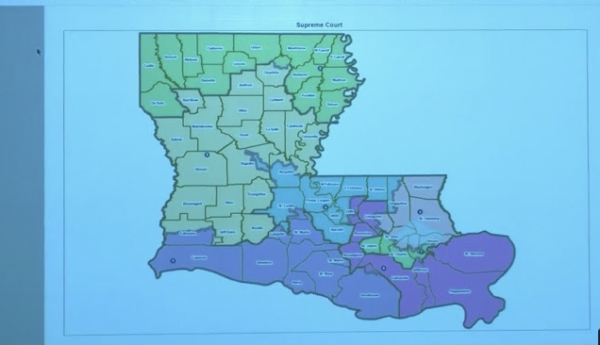The U.S. Supreme Court put on hold a legal dispute over Louisiana’s voting districts, keeping a map that a federal judge said weakened the Black vote in place.
The nation’s highest court issued a stay of the lower court’s order tossing out the disputed map, as a review of a similar case in Alabama is scheduled for next term. The case could also be uprooted by another case scheduled to be heard by the Supreme Court in fall that could topple state court rulings.
Middle District of Louisiana Judge Shelly said the Louisiana congressional map violated the Voting Rights Act because it created one Black district in a state where about a third of the population is Black.

The Republican-led state Legislature approved the map in March, which Louisiana Gov. John Bel Edwards vetoed. However, state lawmakers overrode the governor’s veto, paving the way for the lawsuit by civil rights groups, including the NAACP and voters.
A federal appeals court was scheduled to review the case on July 8, but the state asked the Supreme Court to intervene.
The higher court’s three liberal judges dissented the majority’s order on Tuesday, June 28. Civil rights advocates who challenged the map say it disadvantages Black voters. Republicans who hold the majority in the Louisiana Legislature believe the map already fairly represents the majority-minority district in the state.
“This is another example of a court in a hurry to roll back minority voting rights,” said Richard L. Hasen, a law professor at UCLA.
Section 2 of the Voting Rights Act prohibits any voting procedure that “results in a denial or abridgment of the right of any citizen of the United States to vote on account of race.”
A violation “is established if, based on the totality of circumstances” that limit racial minorities’ opportunities to vote.
The congressional map splits the remaining Black voters among the state’s other five districts.
Louisiana Attorney General Jeff Landry argued lawmakers could not draw two majority-Black districts without “segregating the races for purposes of voting.” He also argued that changing the maps would create chaos ahead of the fall elections and “divisive electoral pandemonium.”
“It is impossible to draw a map without prioritizing race as the predominant factor in order to generate a second majority-minority district, which federal courts have cautioned Louisiana not to do in the past,” Landry said in court documents.
However, plaintiffs argued that “a remedial congressional plan can be implemented in advance of the 2022 election without excessive difficult or risk of voter confusion.”
The Supreme Court in February allowed Alabama’s congressional map to stand, suspending a lower’s court decision in the case. Alabama Republicans also drew just one majority Black district, when 27 Percent of the population is Black.
The lower court had ordered the Legislature to redraw the map with a second district. The Supreme Court is scheduled to hear arguments in the Alabama case on Oct. 4.
The justices will also hear a dispute over North Carolina’s newly drawn congressional maps that could have a blanket effect on cases like Alabama’s and Louisiana’s.
North Carolina lawmakers are requesting that the Supreme Court overturn a state court’s ruling that struck down their map and replaced it with a court-drawn map.
The Republican-led Legislature argues that the General Assembly, not the court, has precedent over the running of federal elections and without the checks and balances of the state judicial branch, under the U.S. Constitution Elections Clause.
“The Times, Places and Manner of holding Elections for Senators and Representatives, shall be prescribed in each State by the Legislature thereof; but the Congress may at any time by Law make or alter such Regulations, except as to the Places of chusing Senators,” the clause says.


